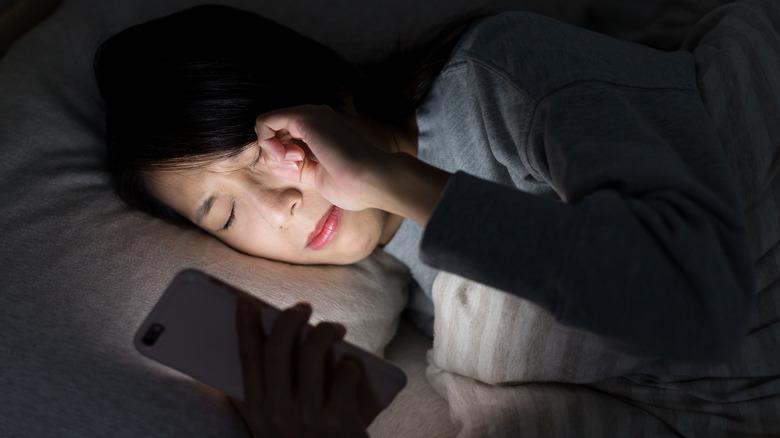What Does It Mean When You're Itchy At Night?
It's not unusual to occasionally feel itchy. You might feel the need to scratch for a variety of reasons, including having dry skin, experiencing contact dermatitis after you have been exposed to something that irritated your skin, or a combination of other reasons (via WebMD). Sometimes you may even know the cause. However, suppose you find yourself constantly feeling itchy at night. In that case, it could end up causing you to lose out on valuable sleep, which might affect your health and overall quality of life (via Advances in Dermatology and Venereology).
According to Healthline, persistent nighttime itchiness is called nocturnal pruritus. If it's disrupting your sleep regularly, it's only natural to want to figure out what's going on so that you can get some relief and catch some Zs. The reason you feel the urge to scratch after the sun goes down could be completely natural — or it could be a sign of something more serious about your health. You must not simply ignore the situation.
Here's how to soothe nighttime itchiness
Healthline reported that, much of the time, nighttime itchiness could be related to your circadian rhythm. Your body's fluid balance, temperature regulation, and even barrier protection change at night, which could account for the natural reasons why your skin itches after sundown (via Advances in Dermatology and Venereology). Cytokines, which your body releases more at night, could also play a role paired with a slowdown in other hormones during the overnight hours. If you already have skin conditions, including inflammatory skin conditions like psoriasis, atopic dermatitis, or chronic idiopathic urticaria, you might feel more discomfort at night.
However, there could be other underlying health-related issues behind why feel itchy. Bedbugs, pinworms, scabies, or lice could be the culprit (via Healthline). If so, getting rid of the infestation should help solve the itching. Other possible causes include kidney or liver disease, iron deficiency, thyroid problems, pregnancy, restless legs syndrome, leukemia or lymphoma, or psychological illnesses like depression and stress (via WebMD).
To help ease the itch, you could try a good moisturizer before bed, a lukewarm bath with colloidal oatmeal or baking soda, a humidifier, and cool compresses to relieve the urge. Keeping your bedroom cool — between 60 and 65 degrees Fahrenheit — can also help (via Healthline). If things worsen or the situation lasts more than two weeks, you need to see your doctor to rule out something more serious.

